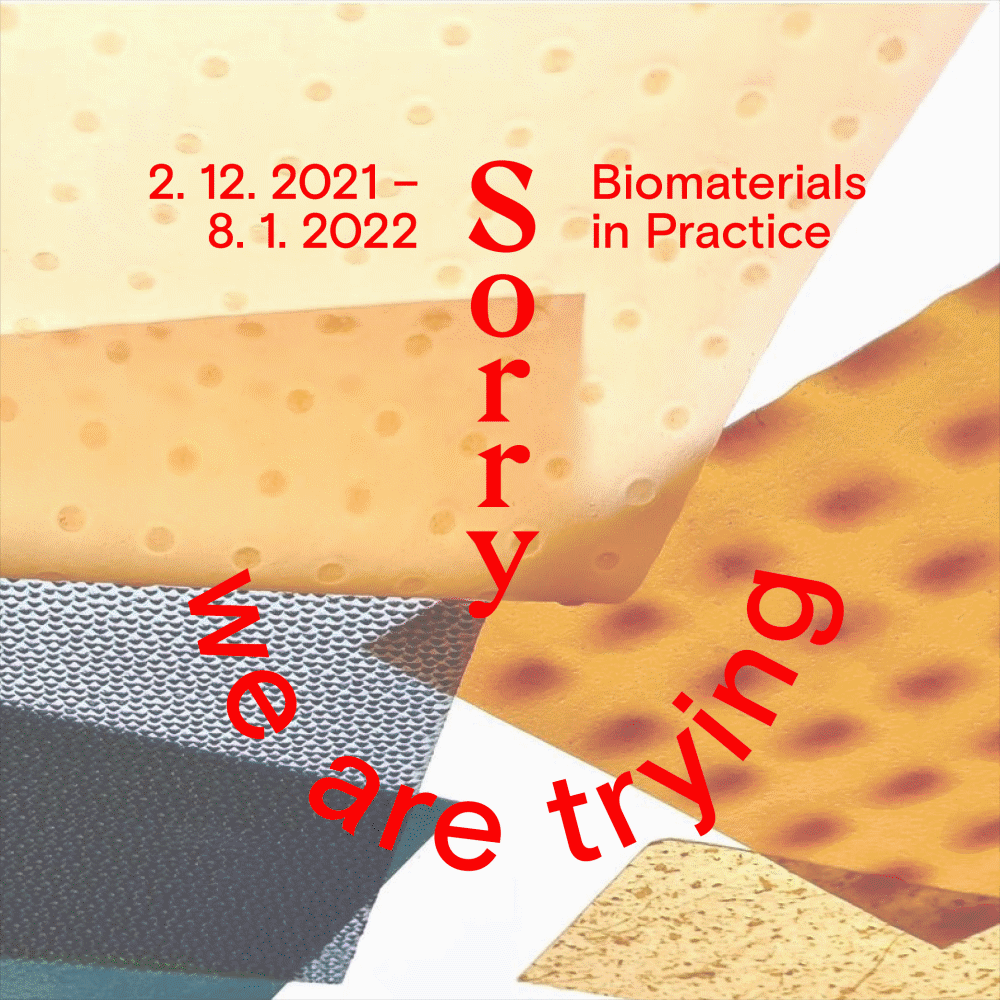Human-made materials now outweigh Earth's entire biomass. The amount of plastic alone is greater in mass than all land animals and marine creatures combined.
(The Guardian, Sandra Laville, 2020)
Eight billion tons of plastic have been produced thus far, and only 9% have been recycled.
(Plastic Roads to Zero Waste,Yusif Idies and Sven Bergmann, 2020)
Although there is no pre-cooked solution to solve the waste problem or save humanity, we do believe that design research can have an impact to support systemic change. The exhibition Sorry, we are trying. Biomaterials in Practice investigates themes of sustainable action and brings together organic products, ephemeral materials and functional designs exploring possibilities of new biological production and waste cycles.
The designers on show work with algae, fruit waste, banana fiber, cellulose, fungal mycelium and plant based bioplastics, producing high quality materials and fashionable everyday objects. Combining scientific and technological processes, they transform raw elements or upgrade biomaterials through design and research, challenging current modes of production and waste systems conceived for petroleum based products.
Our Acknowledgement of 3 limitations of bio materials in practice
1. Fragility of materials: performance and durability have been a major issue on many levels, but we have witnessed breakthroughs / improvements during the past 5 years.
2. Overcoming the testing and experimental phase, entering industrial production systems, is a key challenge.
3. A lack of compatibility of biomaterials with existing waste cycles - the effects of adding new materials to industrial compost are not sufficiently explored.
What we are challenging
4. Oversimplified media representation without sufficient research, focusing on established perspectives.
5. Intransparency of current supply chains, waste and composting systems that are still based on petroleum.
6. Political speech which is presented as neutral or objective, while being heavily informed by the views of representatives from the petroleum sector.
The main obstacles are the production and waste systems in place which were not conceived for new types of biodegradable materials, but for kitchen and garden waste or petroleum products. Future reforms should acknowledge the existance of new biodegradable materials and integrate them within waste cycles.
With this collaborative format, we want to share some questions with our international design community, researchers, scientists and activists, policy makers and general public in Bratislava and beyond:
What can be learned by deconstructing the value chain and zooming into the stages of researching, growing, harvesting, fermenting, molding, welding, sewing, dying, transporting, wrapping, shipping, and so on?
As scientists have already provided so many facts around the imbalances in our system, why isn’t sustainable transformation implemented to a broader extent?
What key gaps in our knowledge should we address to better inform future solutions and innovations of the production and waste system?
During Bratislava Design Week, Zichy gallery will be transformed into a stylish, futuristic bio material concept store which shows fashion items along with innovative materials and a research lab section.
This exhibition is curated by product designer Vlasta Kubušová (Bratislava) and fashion designer Verena Michels (Berlin) whose research into materials and product implementation is informed by interactions with science, academia and industry. Sorry, we are Trying. Biomaterials in Practice has been conceptualised with the generous support of design curators Galit Gaon and Tal Erez (Tel Aviv).
This exhibition has been financially suported using public funds provided by Slovak Arts Council.


EXHIBITORS:
Zuzana Gombošová (Malai, Kerala),
Mogu, Inarzo (VA),
Aurelia Noudelmann (Amsterdam),
Elissa Brunato (Radiant Matter, London),
QWSTION, Bananatex (Switzerland),
Eugenia Morpurgo and Sophia Guggenberger (Syntropia, Venice and Vienna),
Youyang Song (Peelsphere, Berlin), Lukas Wegwerth (Berlin),
Verena Michels (Weather Underground, Berlin),
Vlasta Kubušová and Miroslav Kral (Crafting Plastics studio, Bratislava)
EXPERTS:
Tal Erez (design curator), Galit Gaon (design curator), Ivana Maleš (circular economy consultant), Sven Bergmann (cultural anthropologist)
CURATORS:
Vlasta Kubušová and Verena Michels
CURATORIAL ASSISTANT:
Marlene Stach
Poster series by Šimon Chovan, image credits: PEELSPHERE, crafting plastics studio!, Radiant Matter, Syntropia, Weather Underground
Special Thanks to Georg Elbers, Sophia Guggenberger, Corrado Salzano